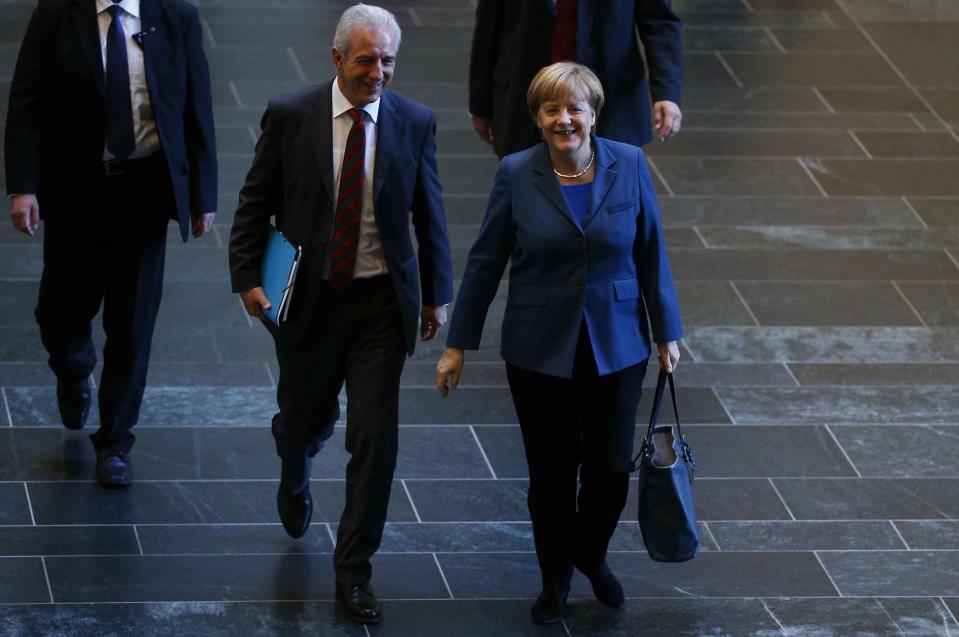Merkel and leftist rivals test ground for coalition
By Stephen Brown BERLIN (Reuters) - Germany's center-left Social Democrats (SPD) dug in their heels on Monday over the introduction of a minimum wage ahead of a second round of exploratory talks with Angela Merkel's conservatives on forming a 'grand coalition' government. The chancellor, who is seeking a partner for her third term after falling just short of a parliamentary majority in an election last month, is still trying to decide whether to enter full-blown negotiations with the SPD or the environmentalist Greens. The SPD reiterated one red line before talks with the conservatives that were due to start at 4 p.m. (10.00 a.m. ET) on Monday: a minimum wage across all sectors of 8.50 euros per month. The demand could be difficult for Merkel to sell to her supporters in the business world. "Clearly labor policy and the minimum wage are very central issues for the SPD," the SPD's second-in-command Andrea Nahles told reporters on Monday. "We're talking about a blanket legal minimum wage of 8.50 for east and west." Conservative leaders say they are willing to compromise on the minimum wage - also demanded by the Greens - but insist that minimum wages should vary from sector to sector and be set by unions and employers rather than by politicians. The SPD came a distant second to the conservatives on September 22 but are determined to exact a high price in return for entering the second 'grand coalition' under Merkel in less than a decade. A compromise seems possible on SPD demands for tax hikes on the rich, but party leaders will need to wring other concessions in order to convince skeptical members to partner with Merkel again. A meeting of 200 SPD officials will decide on October 20 whether to keep talking to Merkel. "CHALLENGE" Merkel's Christian Democratic Union (CDU) and its Bavarian sister party, the Christian Social Union (CSU), emerged as the dominant force from the election but, with 311 of the 631 seats in the Bundestag (lower house), they lack a majority. Merkel held preliminary talks last week with the SPD, who have 193 seats, and the Greens, on 63. Neither seems desperate to join Merkel, whose last partners, the Free Democrats, failed to get into parliament for the first time since 1949. The prospect of talks lasting months worries Germany's European partners, who fear a delay to decisions on measures to fight the euro zone crisis, such as a plan for banking union. German Finance Minister Wolfgang Schaeuble said this weekend Merkel should have a government in place by mid-November, but Nahles said this timetable would be "a challenge". Merkel is keeping alive the option of the Greens despite resistance from CSU, which mocks the party born from the 1970s peacenik movement for its proposal that Germans observe a meat-free "Veggie Day" once a week. "It is important for me that the CDU and CSU's campaign promises come into effect," CSU leader Horst Seehofer said in Munich on Monday. "After all, we won the election." An alliance between conservatives and Greens remains less likely though Merkel made it theoretically possible with her decision in 2011 to accelerate Germany's exit from nuclear power. Such a partnership, tried with mixed results at state level, could have trouble pushing legislation through the Bundesrat upper house. But Merkel may need the Greens, with whom talks are planned for Tuesday, if the SPD baulks. In addition to the green light from 200 senior party officials next week, SPD leaders have promised all of their 472,000 members a vote on a final coalition deal, introducing a further element of uncertainty into the political outlook for Europe's largest economy. (Additional reporting by Hans-Edzard Busemann and Andreas Rinke; Editing by Noah Barkin)


